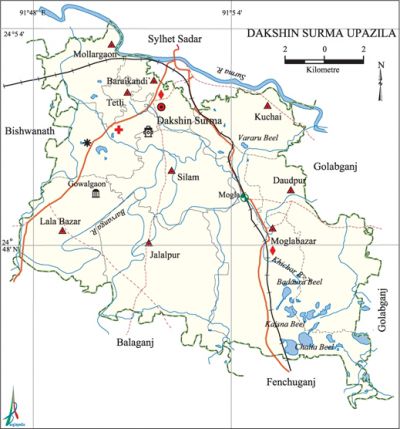Dakshin Surma Upazila
Dakshin Surma Upazila (sylhet district) area 187.66 sq km, located in between 24°43' and 24°54' north latitudes and in between 91°47' and 91°58' east longitudes. It is bounded by sylhet sadar upazila on the north, balaganj and fenchuganj upazilas on the south, golapganj upazila on the east, bishwanath and Balaganj upazilas on the west.
Population Total 253388; male 126315, female 127073; Muslim 243441, Hindu 9899, Christian 4, Buddhist 6 and others 38.
Water bodies Main rivers: surma and Barvanga; Badaura Beel, Kaisna Beel and Chalta Beel are notable.
Administration Dakshin Surma Thana was established in 1983 and it was turned into an upazila in 2005.
| Upazila | ||||||||
| Municipality | Union | Mouza | Village | Population | Density (per sq km) | Literacy rate (%) | ||
| Urban | Rural | Urban | Rural | |||||
| - | 9 | 104 | 309 | 17064 | 236324 | 1350 | 61.1 | 55.6 |
| Upazila Town | ||||
| Area (sq km) | Mouza | Population | Density (per sq km) | Literacy rate (%) |
| 9.80 | 5 | 17064 | 1741 | 61.1 |
| Union | ||||||||
| Name of union and GO code | Area (acre) | Population | Literacy rate (%) | |||||
| Male | Female | |||||||
| Kuchai 45 | 3547 | 9759 | 9406 | 61.4 | ||||
| Jalalpur 37 | 7903 | 17530 | 18391 | 51.3 | ||||
| Tentli 85 | 3427 | 13736 | 13364 | 57.8 | ||||
| Daudpur 30 | 6917 | 12839 | 13506 | 54.3 | ||||
| Baraikandi 36 | 1793 | 11639 | 10700 | 61.9 | ||||
| Mogla Bazar 60 | 8652 | 17228 | 17299 | 53.5 | ||||
| Mollargaon 65 | 2636 | 14032 | 14280 | 55.7 | ||||
| Lala Bazar 50 | 5344 | 14060 | 13995 | 53.6 | ||||
| Silam 75 | 6154 | 15492 | 16132 | 58.7 | ||||
Source Bangladesh Population Census 2011, Bangladesh Bureau of Statistics.

Archaeological heritage and relics Jalalpur zamindar bari.
War of Liberation The Pak army entered many houses of local residents, captured a number of people and killed them on 29 March 1971 on the plea that they took attempt of resistance. There is a memorial square at Kadamtali of the upazila.
For details: see দক্ষিণ সুরমা উপজেলা, বাংলাদেশ মুক্তিযুদ্ধ জ্ঞানকোষ (Encyclopedia of Bangladesh War of Liberation), বাংলাদেশ এশিয়াটিক সোসাইটি, ঢাকা ২০২০, খণ্ড ৪।
Religious institutions Mosque 402, temple 16, church 3, tomb 1.
Literacy rate and educational institutions Average literacy 56.0%; male 57.7%, female 54.3%. Educational institutions: College 5, higher secondary school 2, secondary school 25, primary school 98, community school 10, kindergarten 46, madrasa 50. Noted educational institutions: Nurjahan Mohila College.
Newspapers and periodicals Weekly Amader Sylhet.
Cultural organisations Club 25, community centre 5, cultural organisation 2, women organisation 2, playground 3.
Main sources of income Agriculture 32.64%, non-agricultural labourer 5.42%, industry 1.20%, commerce 16.44%, transport and communication 3.91%, service 6.64%, construction 5.22%, religious service 0.39%, rent and remittance 10.28% and others 17.86%.
Ownership of agricultural land Landowner 42.49%, landless 57.51%.
Tourist spots Mazar of Jinjhir Arkum Shah.
Main crops Paddy, wheat, scented rice.
Extinct or nearly extinct crops Sesame, linseed.
Main fruits Mango, pineapple, lemon, Elephant apple, guava.
Fisheries, dairies and poultries Fishery 30, poultry 5, hatchery 10.
Communication facilities Pucca road 197 km, semi-pucca road 54 km, mud road 274 km; railway 26 km; waterway 18 km.
Extinct or nearly extinct traditional transport Palanquin, horse carriage and bullock cart.
Noted Manufactories ' Flour mill, bread and biscuit factory.
Hats, bazars and fairs Hats and bazars are 23; most noted of which are Mogla Bazar, Jalalpur Bazar, Lala Bazar.
Main exports Fish.
Access to electricity All the unions of the upazila are under electrification net-work. However 78.7% of the dwelling households have access to electricity.
Sources of drinking water Tube-well 83.9%, tap 5.4% and others 10.7%. Presence of arsenic in shallow tube-well water of the upazila has been detected.
Sanitation 78.3% of dwelling households of the upazila use sanitary latrines and 19.4% of dwelling houses use non-sanitary latrines; 2.3% of households do not have latrine facilities.
Health centres Family planning centre 3.
NGO activities Operationally important NGOs are CARE, brac, asa, tmss, ucep. [Sirajul Islam]
References Bangladesh Population Census 2001 and 2011, Bangladesh Bureau of Statistics; Field report of Dakshin Surma Upazila 2010.
